Reflecting on Leadership: Personal Insights and Development
VerifiedAdded on 2020/02/24
|7
|1800
|59
Essay
AI Summary
This essay presents a personal reflection on a leadership study, detailing the author's evolving understanding of leadership from a position of authority to a collective phenomenon grounded in values, ethics, and relationships. The author discusses the shift in perspective from viewing leadership as innate to a skill that can be learned, emphasizing the importance of vision, identity, and passion. The reflection highlights the impact of the course on personal development, including clarifying values, setting identity, and focusing vision. It also addresses gender bias in leadership and its implications. The author explores the practical applications of the learned concepts in various settings and acknowledges the continuous nature of learning and the need for ongoing improvement in areas such as motivation and understanding different leadership styles. The essay concludes by emphasizing the importance of self-understanding and integrity in effective leadership.
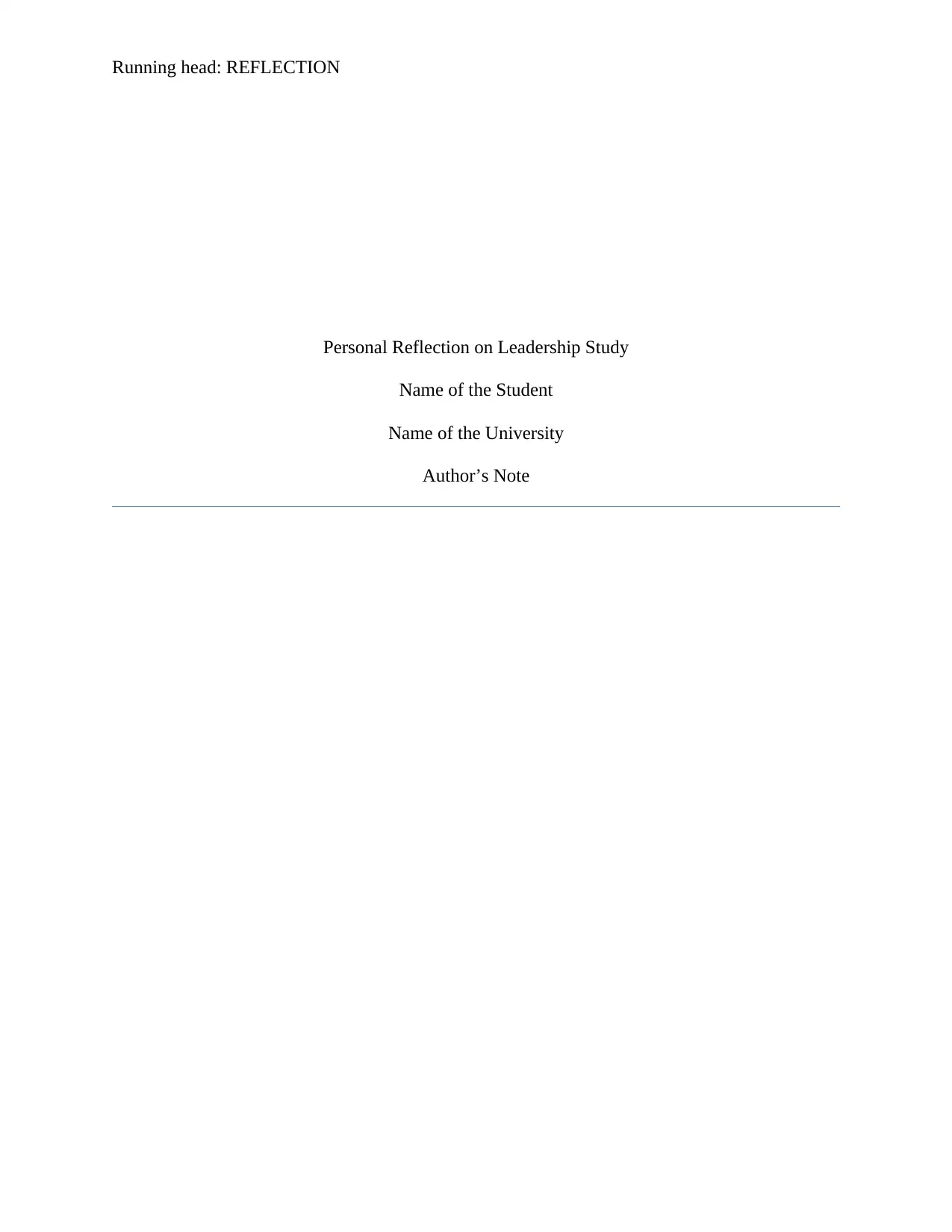
Running head: REFLECTION
Personal Reflection on Leadership Study
Name of the Student
Name of the University
Author’s Note
Personal Reflection on Leadership Study
Name of the Student
Name of the University
Author’s Note
Paraphrase This Document
Need a fresh take? Get an instant paraphrase of this document with our AI Paraphraser
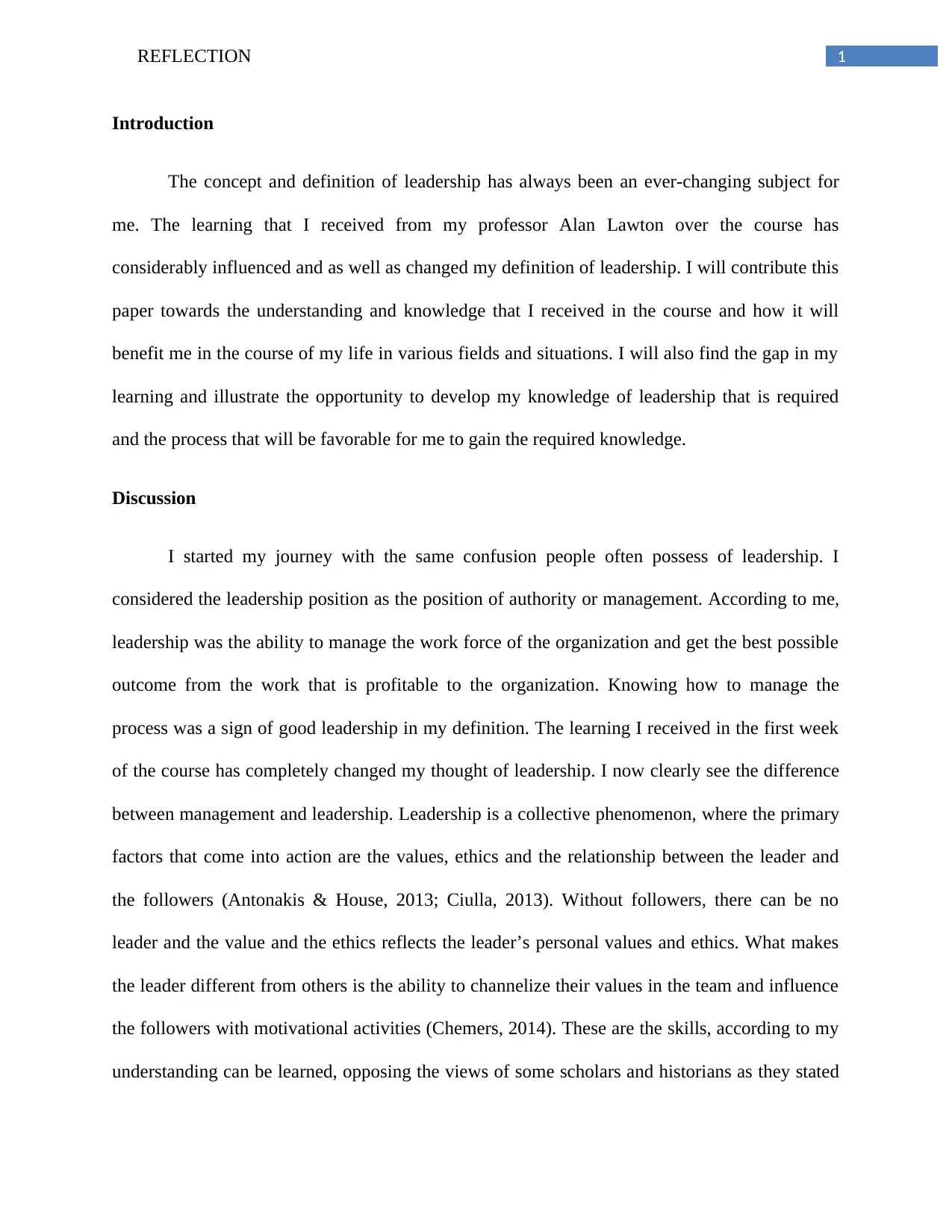
1REFLECTION
Introduction
The concept and definition of leadership has always been an ever-changing subject for
me. The learning that I received from my professor Alan Lawton over the course has
considerably influenced and as well as changed my definition of leadership. I will contribute this
paper towards the understanding and knowledge that I received in the course and how it will
benefit me in the course of my life in various fields and situations. I will also find the gap in my
learning and illustrate the opportunity to develop my knowledge of leadership that is required
and the process that will be favorable for me to gain the required knowledge.
Discussion
I started my journey with the same confusion people often possess of leadership. I
considered the leadership position as the position of authority or management. According to me,
leadership was the ability to manage the work force of the organization and get the best possible
outcome from the work that is profitable to the organization. Knowing how to manage the
process was a sign of good leadership in my definition. The learning I received in the first week
of the course has completely changed my thought of leadership. I now clearly see the difference
between management and leadership. Leadership is a collective phenomenon, where the primary
factors that come into action are the values, ethics and the relationship between the leader and
the followers (Antonakis & House, 2013; Ciulla, 2013). Without followers, there can be no
leader and the value and the ethics reflects the leader’s personal values and ethics. What makes
the leader different from others is the ability to channelize their values in the team and influence
the followers with motivational activities (Chemers, 2014). These are the skills, according to my
understanding can be learned, opposing the views of some scholars and historians as they stated
Introduction
The concept and definition of leadership has always been an ever-changing subject for
me. The learning that I received from my professor Alan Lawton over the course has
considerably influenced and as well as changed my definition of leadership. I will contribute this
paper towards the understanding and knowledge that I received in the course and how it will
benefit me in the course of my life in various fields and situations. I will also find the gap in my
learning and illustrate the opportunity to develop my knowledge of leadership that is required
and the process that will be favorable for me to gain the required knowledge.
Discussion
I started my journey with the same confusion people often possess of leadership. I
considered the leadership position as the position of authority or management. According to me,
leadership was the ability to manage the work force of the organization and get the best possible
outcome from the work that is profitable to the organization. Knowing how to manage the
process was a sign of good leadership in my definition. The learning I received in the first week
of the course has completely changed my thought of leadership. I now clearly see the difference
between management and leadership. Leadership is a collective phenomenon, where the primary
factors that come into action are the values, ethics and the relationship between the leader and
the followers (Antonakis & House, 2013; Ciulla, 2013). Without followers, there can be no
leader and the value and the ethics reflects the leader’s personal values and ethics. What makes
the leader different from others is the ability to channelize their values in the team and influence
the followers with motivational activities (Chemers, 2014). These are the skills, according to my
understanding can be learned, opposing the views of some scholars and historians as they stated
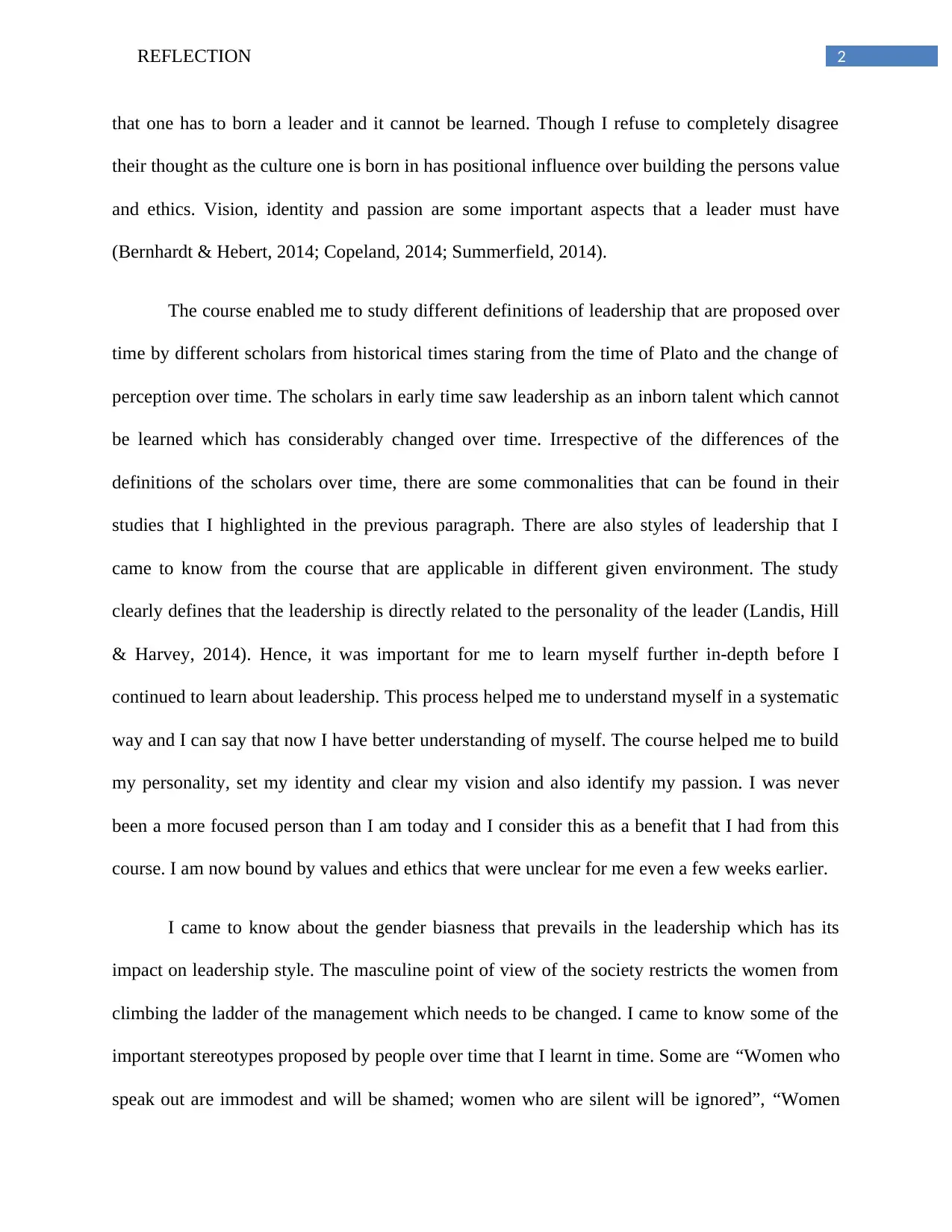
2REFLECTION
that one has to born a leader and it cannot be learned. Though I refuse to completely disagree
their thought as the culture one is born in has positional influence over building the persons value
and ethics. Vision, identity and passion are some important aspects that a leader must have
(Bernhardt & Hebert, 2014; Copeland, 2014; Summerfield, 2014).
The course enabled me to study different definitions of leadership that are proposed over
time by different scholars from historical times staring from the time of Plato and the change of
perception over time. The scholars in early time saw leadership as an inborn talent which cannot
be learned which has considerably changed over time. Irrespective of the differences of the
definitions of the scholars over time, there are some commonalities that can be found in their
studies that I highlighted in the previous paragraph. There are also styles of leadership that I
came to know from the course that are applicable in different given environment. The study
clearly defines that the leadership is directly related to the personality of the leader (Landis, Hill
& Harvey, 2014). Hence, it was important for me to learn myself further in-depth before I
continued to learn about leadership. This process helped me to understand myself in a systematic
way and I can say that now I have better understanding of myself. The course helped me to build
my personality, set my identity and clear my vision and also identify my passion. I was never
been a more focused person than I am today and I consider this as a benefit that I had from this
course. I am now bound by values and ethics that were unclear for me even a few weeks earlier.
I came to know about the gender biasness that prevails in the leadership which has its
impact on leadership style. The masculine point of view of the society restricts the women from
climbing the ladder of the management which needs to be changed. I came to know some of the
important stereotypes proposed by people over time that I learnt in time. Some are “Women who
speak out are immodest and will be shamed; women who are silent will be ignored”, “Women
that one has to born a leader and it cannot be learned. Though I refuse to completely disagree
their thought as the culture one is born in has positional influence over building the persons value
and ethics. Vision, identity and passion are some important aspects that a leader must have
(Bernhardt & Hebert, 2014; Copeland, 2014; Summerfield, 2014).
The course enabled me to study different definitions of leadership that are proposed over
time by different scholars from historical times staring from the time of Plato and the change of
perception over time. The scholars in early time saw leadership as an inborn talent which cannot
be learned which has considerably changed over time. Irrespective of the differences of the
definitions of the scholars over time, there are some commonalities that can be found in their
studies that I highlighted in the previous paragraph. There are also styles of leadership that I
came to know from the course that are applicable in different given environment. The study
clearly defines that the leadership is directly related to the personality of the leader (Landis, Hill
& Harvey, 2014). Hence, it was important for me to learn myself further in-depth before I
continued to learn about leadership. This process helped me to understand myself in a systematic
way and I can say that now I have better understanding of myself. The course helped me to build
my personality, set my identity and clear my vision and also identify my passion. I was never
been a more focused person than I am today and I consider this as a benefit that I had from this
course. I am now bound by values and ethics that were unclear for me even a few weeks earlier.
I came to know about the gender biasness that prevails in the leadership which has its
impact on leadership style. The masculine point of view of the society restricts the women from
climbing the ladder of the management which needs to be changed. I came to know some of the
important stereotypes proposed by people over time that I learnt in time. Some are “Women who
speak out are immodest and will be shamed; women who are silent will be ignored”, “Women
⊘ This is a preview!⊘
Do you want full access?
Subscribe today to unlock all pages.

Trusted by 1+ million students worldwide
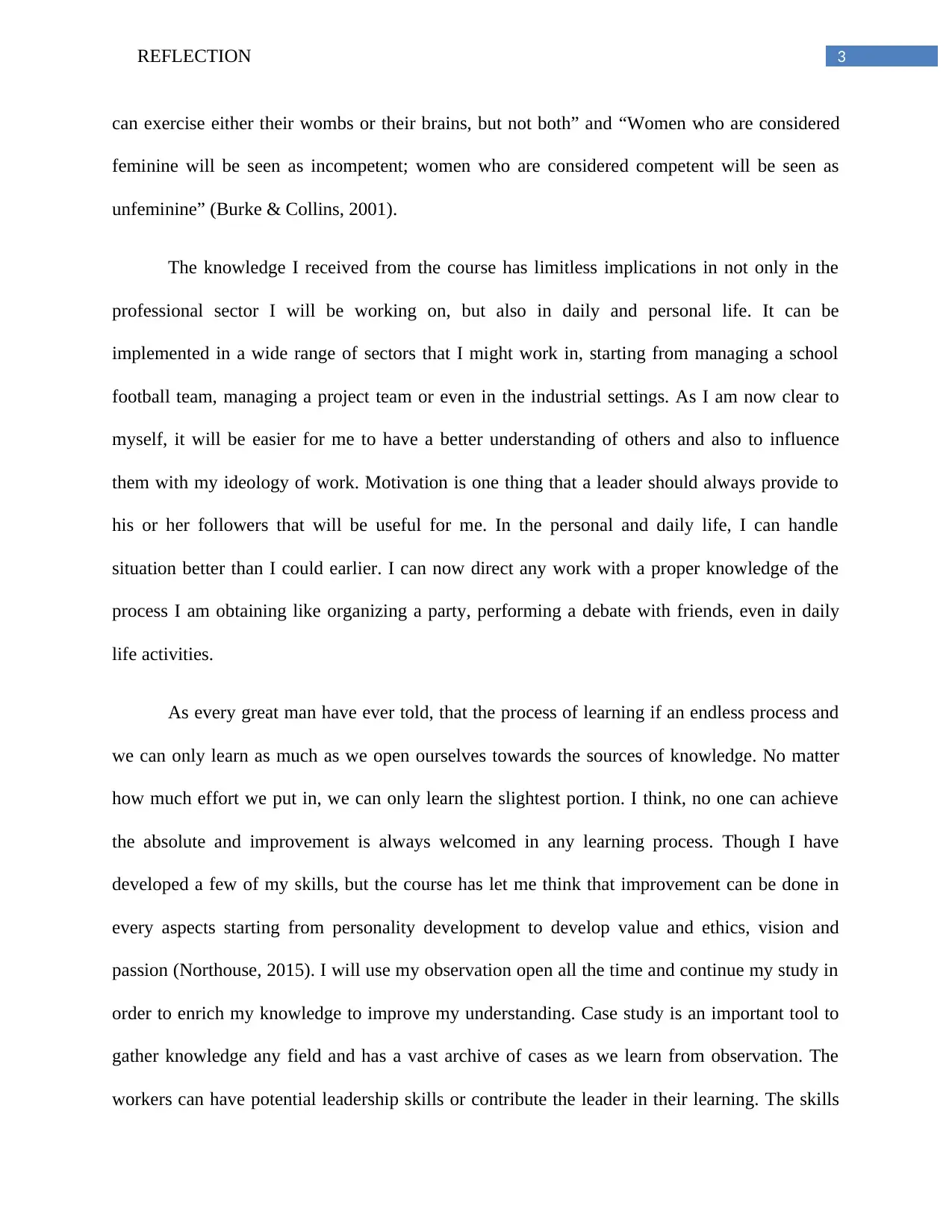
3REFLECTION
can exercise either their wombs or their brains, but not both” and “Women who are considered
feminine will be seen as incompetent; women who are considered competent will be seen as
unfeminine” (Burke & Collins, 2001).
The knowledge I received from the course has limitless implications in not only in the
professional sector I will be working on, but also in daily and personal life. It can be
implemented in a wide range of sectors that I might work in, starting from managing a school
football team, managing a project team or even in the industrial settings. As I am now clear to
myself, it will be easier for me to have a better understanding of others and also to influence
them with my ideology of work. Motivation is one thing that a leader should always provide to
his or her followers that will be useful for me. In the personal and daily life, I can handle
situation better than I could earlier. I can now direct any work with a proper knowledge of the
process I am obtaining like organizing a party, performing a debate with friends, even in daily
life activities.
As every great man have ever told, that the process of learning if an endless process and
we can only learn as much as we open ourselves towards the sources of knowledge. No matter
how much effort we put in, we can only learn the slightest portion. I think, no one can achieve
the absolute and improvement is always welcomed in any learning process. Though I have
developed a few of my skills, but the course has let me think that improvement can be done in
every aspects starting from personality development to develop value and ethics, vision and
passion (Northouse, 2015). I will use my observation open all the time and continue my study in
order to enrich my knowledge to improve my understanding. Case study is an important tool to
gather knowledge any field and has a vast archive of cases as we learn from observation. The
workers can have potential leadership skills or contribute the leader in their learning. The skills
can exercise either their wombs or their brains, but not both” and “Women who are considered
feminine will be seen as incompetent; women who are considered competent will be seen as
unfeminine” (Burke & Collins, 2001).
The knowledge I received from the course has limitless implications in not only in the
professional sector I will be working on, but also in daily and personal life. It can be
implemented in a wide range of sectors that I might work in, starting from managing a school
football team, managing a project team or even in the industrial settings. As I am now clear to
myself, it will be easier for me to have a better understanding of others and also to influence
them with my ideology of work. Motivation is one thing that a leader should always provide to
his or her followers that will be useful for me. In the personal and daily life, I can handle
situation better than I could earlier. I can now direct any work with a proper knowledge of the
process I am obtaining like organizing a party, performing a debate with friends, even in daily
life activities.
As every great man have ever told, that the process of learning if an endless process and
we can only learn as much as we open ourselves towards the sources of knowledge. No matter
how much effort we put in, we can only learn the slightest portion. I think, no one can achieve
the absolute and improvement is always welcomed in any learning process. Though I have
developed a few of my skills, but the course has let me think that improvement can be done in
every aspects starting from personality development to develop value and ethics, vision and
passion (Northouse, 2015). I will use my observation open all the time and continue my study in
order to enrich my knowledge to improve my understanding. Case study is an important tool to
gather knowledge any field and has a vast archive of cases as we learn from observation. The
workers can have potential leadership skills or contribute the leader in their learning. The skills
Paraphrase This Document
Need a fresh take? Get an instant paraphrase of this document with our AI Paraphraser
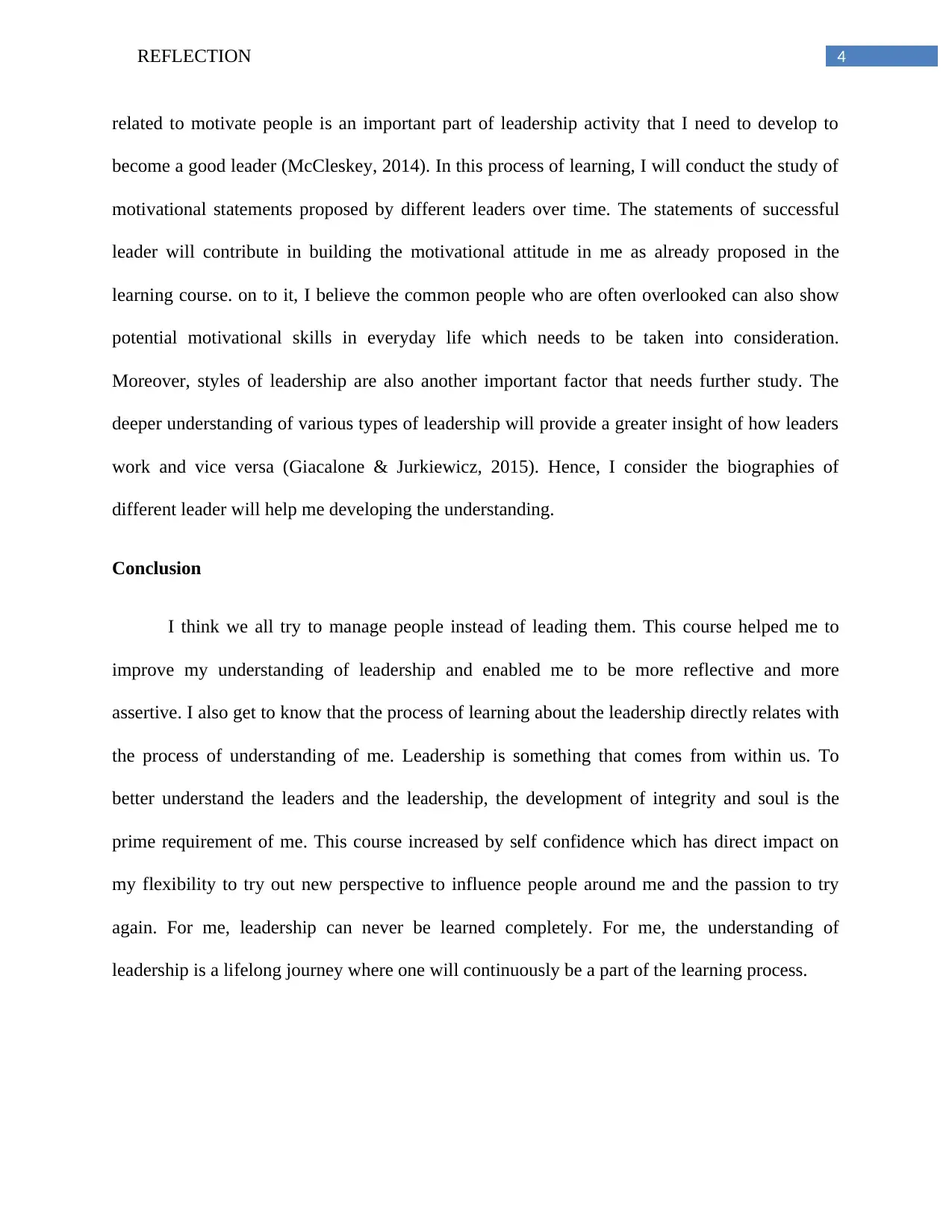
4REFLECTION
related to motivate people is an important part of leadership activity that I need to develop to
become a good leader (McCleskey, 2014). In this process of learning, I will conduct the study of
motivational statements proposed by different leaders over time. The statements of successful
leader will contribute in building the motivational attitude in me as already proposed in the
learning course. on to it, I believe the common people who are often overlooked can also show
potential motivational skills in everyday life which needs to be taken into consideration.
Moreover, styles of leadership are also another important factor that needs further study. The
deeper understanding of various types of leadership will provide a greater insight of how leaders
work and vice versa (Giacalone & Jurkiewicz, 2015). Hence, I consider the biographies of
different leader will help me developing the understanding.
Conclusion
I think we all try to manage people instead of leading them. This course helped me to
improve my understanding of leadership and enabled me to be more reflective and more
assertive. I also get to know that the process of learning about the leadership directly relates with
the process of understanding of me. Leadership is something that comes from within us. To
better understand the leaders and the leadership, the development of integrity and soul is the
prime requirement of me. This course increased by self confidence which has direct impact on
my flexibility to try out new perspective to influence people around me and the passion to try
again. For me, leadership can never be learned completely. For me, the understanding of
leadership is a lifelong journey where one will continuously be a part of the learning process.
related to motivate people is an important part of leadership activity that I need to develop to
become a good leader (McCleskey, 2014). In this process of learning, I will conduct the study of
motivational statements proposed by different leaders over time. The statements of successful
leader will contribute in building the motivational attitude in me as already proposed in the
learning course. on to it, I believe the common people who are often overlooked can also show
potential motivational skills in everyday life which needs to be taken into consideration.
Moreover, styles of leadership are also another important factor that needs further study. The
deeper understanding of various types of leadership will provide a greater insight of how leaders
work and vice versa (Giacalone & Jurkiewicz, 2015). Hence, I consider the biographies of
different leader will help me developing the understanding.
Conclusion
I think we all try to manage people instead of leading them. This course helped me to
improve my understanding of leadership and enabled me to be more reflective and more
assertive. I also get to know that the process of learning about the leadership directly relates with
the process of understanding of me. Leadership is something that comes from within us. To
better understand the leaders and the leadership, the development of integrity and soul is the
prime requirement of me. This course increased by self confidence which has direct impact on
my flexibility to try out new perspective to influence people around me and the passion to try
again. For me, leadership can never be learned completely. For me, the understanding of
leadership is a lifelong journey where one will continuously be a part of the learning process.
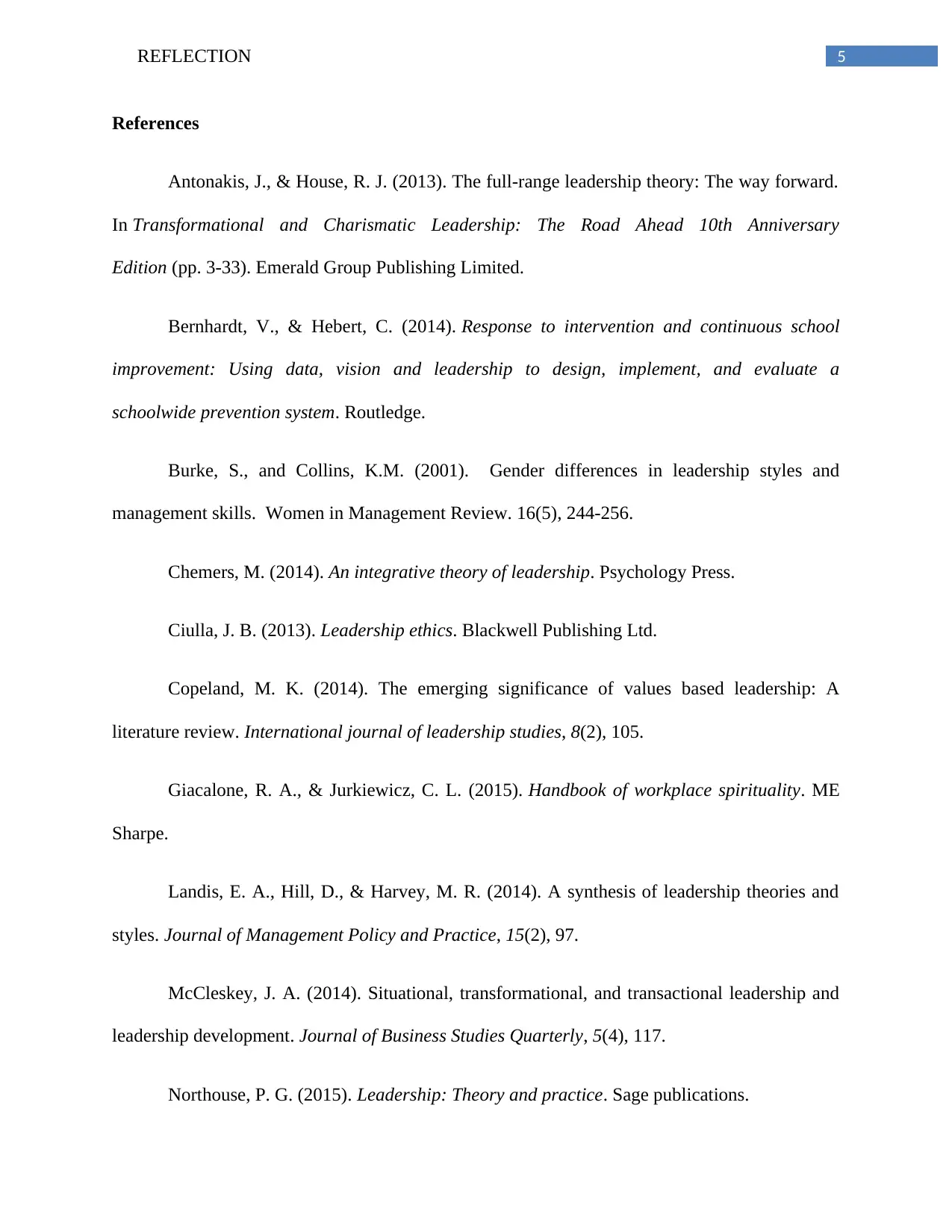
5REFLECTION
References
Antonakis, J., & House, R. J. (2013). The full-range leadership theory: The way forward.
In Transformational and Charismatic Leadership: The Road Ahead 10th Anniversary
Edition (pp. 3-33). Emerald Group Publishing Limited.
Bernhardt, V., & Hebert, C. (2014). Response to intervention and continuous school
improvement: Using data, vision and leadership to design, implement, and evaluate a
schoolwide prevention system. Routledge.
Burke, S., and Collins, K.M. (2001). Gender differences in leadership styles and
management skills. Women in Management Review. 16(5), 244-256.
Chemers, M. (2014). An integrative theory of leadership. Psychology Press.
Ciulla, J. B. (2013). Leadership ethics. Blackwell Publishing Ltd.
Copeland, M. K. (2014). The emerging significance of values based leadership: A
literature review. International journal of leadership studies, 8(2), 105.
Giacalone, R. A., & Jurkiewicz, C. L. (2015). Handbook of workplace spirituality. ME
Sharpe.
Landis, E. A., Hill, D., & Harvey, M. R. (2014). A synthesis of leadership theories and
styles. Journal of Management Policy and Practice, 15(2), 97.
McCleskey, J. A. (2014). Situational, transformational, and transactional leadership and
leadership development. Journal of Business Studies Quarterly, 5(4), 117.
Northouse, P. G. (2015). Leadership: Theory and practice. Sage publications.
References
Antonakis, J., & House, R. J. (2013). The full-range leadership theory: The way forward.
In Transformational and Charismatic Leadership: The Road Ahead 10th Anniversary
Edition (pp. 3-33). Emerald Group Publishing Limited.
Bernhardt, V., & Hebert, C. (2014). Response to intervention and continuous school
improvement: Using data, vision and leadership to design, implement, and evaluate a
schoolwide prevention system. Routledge.
Burke, S., and Collins, K.M. (2001). Gender differences in leadership styles and
management skills. Women in Management Review. 16(5), 244-256.
Chemers, M. (2014). An integrative theory of leadership. Psychology Press.
Ciulla, J. B. (2013). Leadership ethics. Blackwell Publishing Ltd.
Copeland, M. K. (2014). The emerging significance of values based leadership: A
literature review. International journal of leadership studies, 8(2), 105.
Giacalone, R. A., & Jurkiewicz, C. L. (2015). Handbook of workplace spirituality. ME
Sharpe.
Landis, E. A., Hill, D., & Harvey, M. R. (2014). A synthesis of leadership theories and
styles. Journal of Management Policy and Practice, 15(2), 97.
McCleskey, J. A. (2014). Situational, transformational, and transactional leadership and
leadership development. Journal of Business Studies Quarterly, 5(4), 117.
Northouse, P. G. (2015). Leadership: Theory and practice. Sage publications.
⊘ This is a preview!⊘
Do you want full access?
Subscribe today to unlock all pages.

Trusted by 1+ million students worldwide
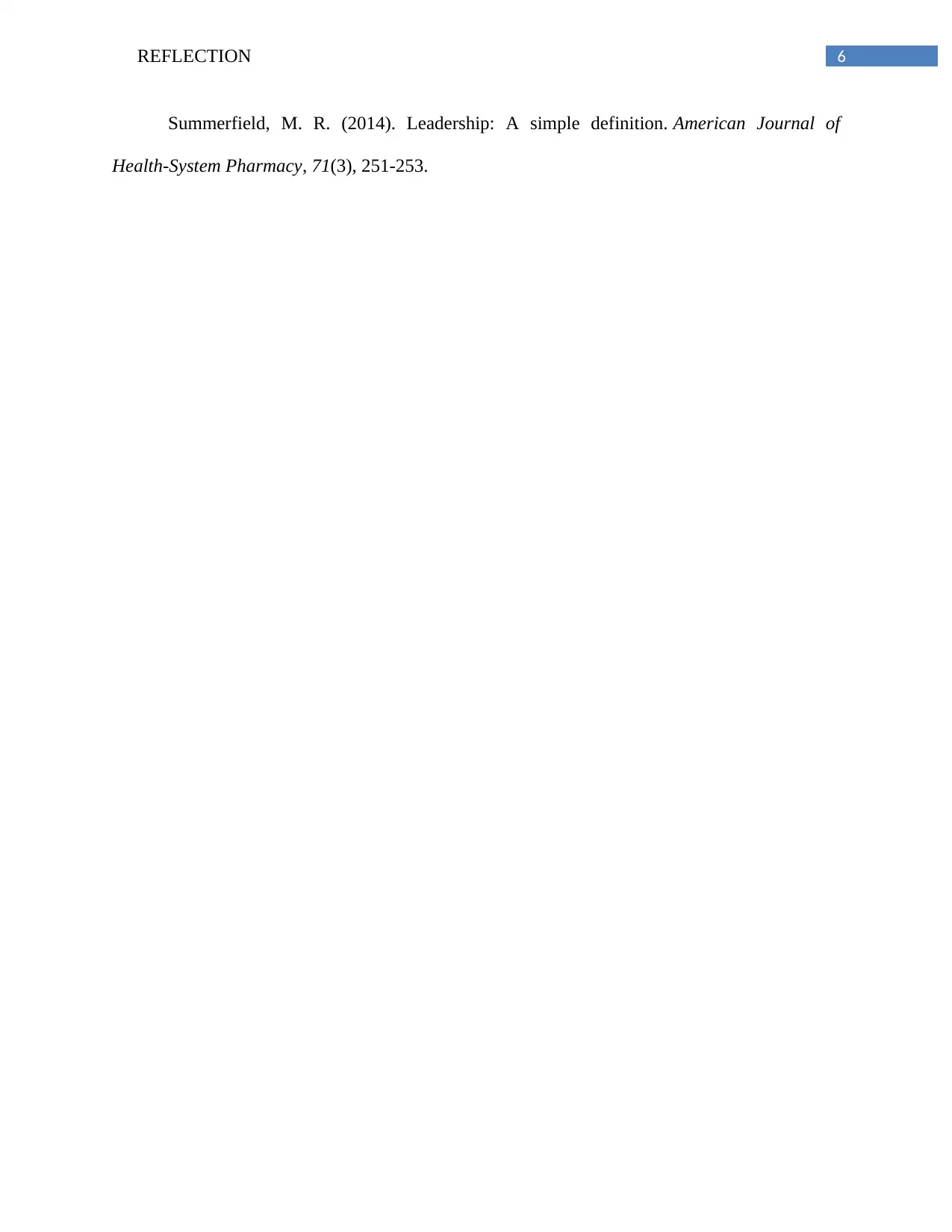
6REFLECTION
Summerfield, M. R. (2014). Leadership: A simple definition. American Journal of
Health-System Pharmacy, 71(3), 251-253.
Summerfield, M. R. (2014). Leadership: A simple definition. American Journal of
Health-System Pharmacy, 71(3), 251-253.
1 out of 7
Related Documents
Your All-in-One AI-Powered Toolkit for Academic Success.
+13062052269
info@desklib.com
Available 24*7 on WhatsApp / Email
![[object Object]](/_next/static/media/star-bottom.7253800d.svg)
Unlock your academic potential
Copyright © 2020–2025 A2Z Services. All Rights Reserved. Developed and managed by ZUCOL.




